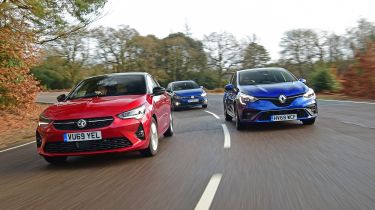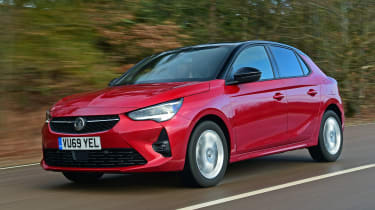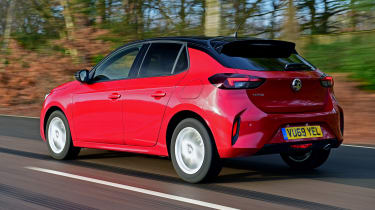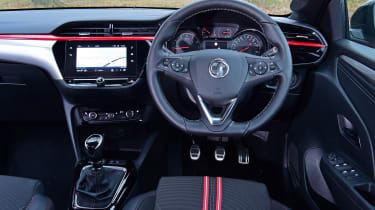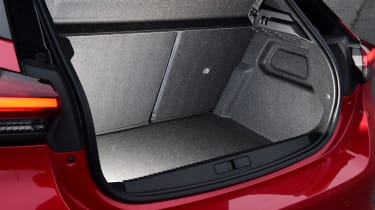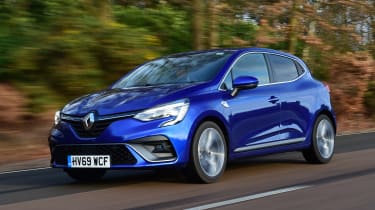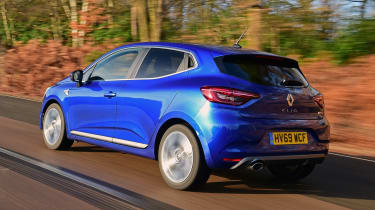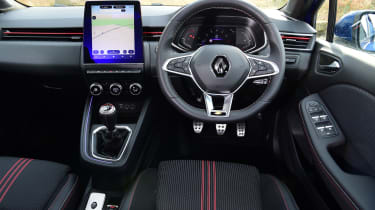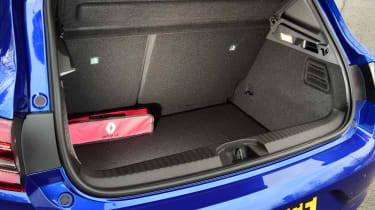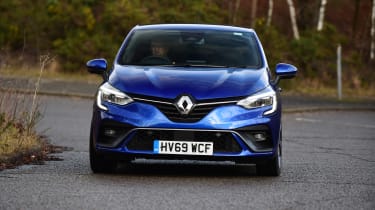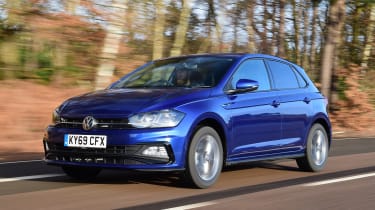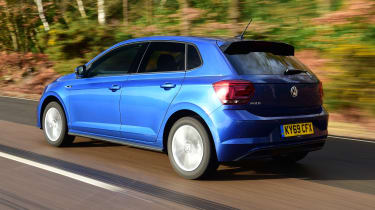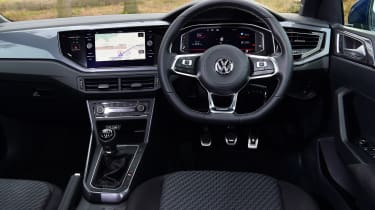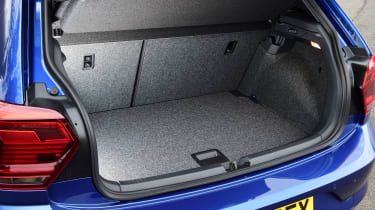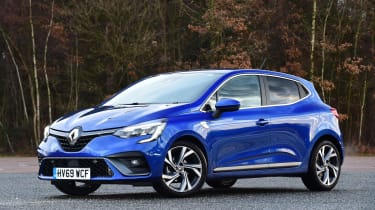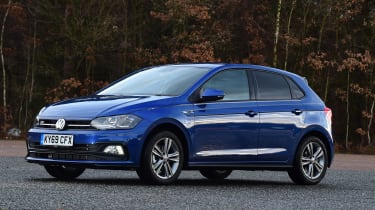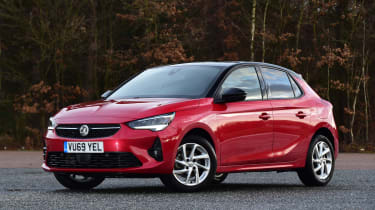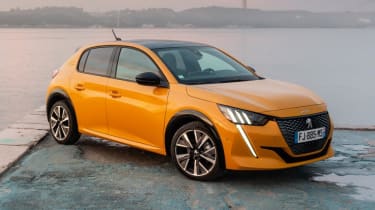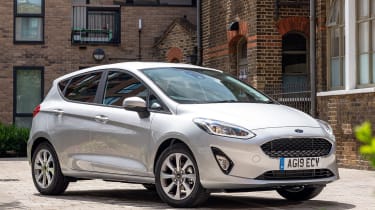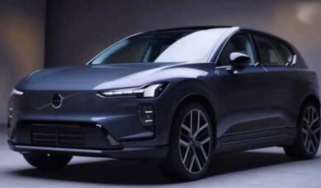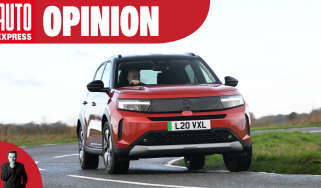Vauxhall Corsa vs Renault Clio vs Volkswagen Polo
In a tough supermini contest, the all-new Vauxhall Corsa takes on the Renault Clio and Volkswagen Polo
At the end of last year, we crowned a new supermini class champion. The Renault Clio’s ascension to the top of the hotly contested sector saw it beat two tough rivals in the shape of the Ford Fiesta and SEAT Ibiza – but now the French challenger is having to face fresh competition itself, with the arrival of the new Vauxhall Corsa.
This iconic car from the British brand kicks things off in this triple test, and we’re putting it up against our Clio class champion to see if it has what it takes to win. With the previous Corsa a regular fixture towards the top of the monthly registration charts in the UK, this sixth-generation car has a lot to live up to. It’s fair to say that its predecessor was getting a little long in the tooth, so this all-new model should inject a much-needed dose of freshness.
Corsa’s price has crept up with this new car, though, so it’s squarely in the firing line of the Volkswagen Polo. The German car has always been viewed as a premium supermini, so the Vauxhall will need to match it for upmarket appeal.
Vauxhall Corsa
| Model: | Vauxhall Corsa 1.2 Turbo 100 SRi Nav |
| Price | £19,200 |
| Engine: | 1.2-litre 3cyl petrol, 99bhp |
| 0-60mph: | 10.4 seconds |
| Test economy: | 45.7mpg/10.1mpl |
| CO2: | 96g/km |
| Annual road tax: | £145 |
The all-new Vauxhall Corsa has an interesting back story, and its development has led to some impressive technical achievements – but does this translate into a competitive car? We’re testing the £19,200 1.2 Turbo 100 SRi Nav model to find out.
Design & engineering
More than 2.1 million Corsas have been sold in the UK since 1993, so it’s a big car for Britain, let alone Vauxhall – and that means this sixth-generation model is significant.
Used - available now

2017 Vauxhall
Corsa
50,000 milesManualPetrol1.4L
Cash £3,995
2025 Vauxhall
Corsa
14,765 milesManualPetrol1.2L
Cash £14,176
2021 Vauxhall
Corsa
54,600 milesAutomaticPetrol1.2L
Cash £10,995
2014 Vauxhall
Corsa
68,164 milesManualPetrol1.2L
Cash £3,995Before its merger with Groupe PSA, Vauxhall had almost completed development of a fresh Corsa under its period of ownership by General Motors. But following the sale of Vauxhall to PSA, the firm set about developing the new car on a shared platform in double-quick time.
That platform is called CMP, and the Corsa shares it with the Peugeot 208, among others. The big news with this architecture is that the car weighs as little as 980kg, which is up to 108kg lighter than its predecessor. The body weighs 40kg less, aluminium engines save 15kg, the front seats save 5.5kg, the rears 4.5kg, while an aluminium bonnet sheds 2.4kg.
There’s a new engine too – well, new to Vauxhall anyway. It’s a 99bhp 1.2-litre turbocharged triple, and features a six-speed manual gearbox here.
The platform’s suspension is fairly conventional, with struts at the front and a torsion beam at the rear, but one thing that is clever is that the platform has been designed to accept an EV variant. The Corsa-e, with a 209-mile range, goes on sale later this year.
At £19,200 in SRi Nav trim, the Corsa is the priciest car here, but there are plenty of technological innovations to go with that rise in price compared with its predecessor. For example, Apple CarPlay and Android Auto are standard across the range, and all cars get a seven-inch touchscreen.
LED lights are also included, while connected services take a big step on and there’s more safety tech as well. Alongside the LED lights, SRi Nav features cruise control, air-con, keyless operation, sports seats and parking sensors. Beyond this, the only real option is what colour you want (metallic paint is £565 to £650, depending on what colour you choose).
Driving
The Corsa has the most torque of all three cars here, with 205Nm at 1,750rpm – the Clio has 160Nm and the Polo has 175Nm, and the difference is noticeable from behind the wheel. The Vauxhall’s 1.2-litre engine is punchy and has plenty of in-gear shove, thanks in part to the car’s weight savings.
Our tests backed this up. The Vauxhall went from 30-50mph in 4.0 seconds in third gear, which was 1.1 seconds faster than the Polo and 1.3 seconds ahead of the Clio. It was also faster from 50-70mph in fifth, taking 9.3 seconds – the Renault took 15.7 seconds and the VW took 13.1 seconds in that test. As well as its additional torque, the Corsa also has a six-speed gearbox when its rivals have five. This means the Corsa is able to run with shorter ratios, which is a big plus for performance.
However, the Corsa isn’t much fun to drive. The steering is quick, but has very little feel, so it’s too easy to upset the car’s balance as you turn in. There’s not as much grip as in its rivals, either.
The Corsa’s ride is average, because while it’s not stiffly set up, the car does constantly move and shuffle on rough British roads. The Polo is significantly more settled, as well as being more refined.
Practicality
There's no three-door option any more, and all Corsas come with five doors. However, the rear doors aren’t the biggest, so access to the back seats isn’t as easy as in its rivals.
Once you’re sat in the back, the Corsa is also less spacious than either the Clio or Polo. The fact that the rear windowline rises up doesn’t help either.
Unfortunately, the tight rear seats aren’t offset by a generous boot. The Corsa’s 309-litre capacity is acceptable, but superminis have evolved from their roots, and cars such as the Polo and Clio now offer more space, to the point where the 391-litre Renault now outstrips the larger VW Golf for luggage room.
Despite this, the Corsa is practical enough. Interior ergonomics are fine, too, and there’s a reasonable amount of storage space.
Ownership
None of these brands performed well in our Driver Power 2019 satisfaction poll. Vauxhall – before its operations were taken over by PSA– ranked the poorest, taking 29th place out of 30 brands in our most recent rundown.
The Corsa’s performance in its Euro NCAP safety test also lagged a little behind its rivals. The Vauxhall only scored four out of five stars compared with a full five-star rating for its competitors. That’s despite it featuring the same number of airbags (six), as well as autonomous braking, a tiredness monitor and lane-keep assist as standard.
Running costs
Economy is key for a supermini, and all three cars here returned in excess of 40mpg, the Corsa recording a test best of 45.7mpg.
A 96g/km rating for CO2 emissions means the Vauxhall is competitive in terms of company car costs, too. The Renault emits 99g/km, putting it in the same 23 per cent Benefit in Kind tax bracket, while the VW pumps out 106g/km, putting it in the 25 per cent BiK class.
However, because the Corsa has the highest list price, it’ll still be more expensive to run than the Renault as a company car, costing £875 compared with £819. The Polo comes in at £930 per year in company car contributions for the same driver.
Testers’ notes
“There are few individual options on the new Corsa. If you want to add features such as climate control, built-in nav or heated seats, Vauxhall forces you to step up to the next trim level.”
Renault Clio
| Model: | Renault Clio TCe 100 R.S. Line |
| Price | £17,995 |
| Engine: | 1.0-litre 3cyl petrol, 99bhp |
| 0-60mph: | 11.2 seconds |
| Test economy: | 44.0mpg/9.7mpl |
| CO2: | 99g/km |
| Annual road tax: | £145 |
The Renault Clio returns as our reigning supermini champ for its second test. We’re rating it in sporty R.S. Line trim to match the Corsa SRi Nav. With Renault’s TCe 100 engine it comes in at £17,995, undercutting the Vauxhall by £1,205.
Design & engineering
It costs less than the Corsa, but the Clio doesn’t scrimp on kit. As with the Vauxhall, sat-nav is standard, and so are Apple CarPlay and Android Auto as part of the infotainment system. It also gets LED headlights and parking sensors like the Corsa, but a reversing camera is included, too. Basic safety kit is a match, but in addition the Clio features climate control and keyless operation.
Under the skin – which has subtly evolved for this fifth-generation car to look more like the larger Mégane – the Clio is based on a new CMF-B platform, which has improved packaging compared with its predecessor. Like the Vauxhall, MacPherson struts are used up front, with a torsion beam at the rear.
While the Clio gives away 200cc to the Corsa, its 1.0-litre three-cylinder turbo petrol engine produces an identical 99bhp, although its 160Nm of torque is significantly less than the Vauxhall’s 205Nm. But whereas the Vauxhall is considerably lighter than its predecessor, it’s a similar weight to the Clio.
Unlike the Corsa’s, though, the Clio’s manual gearbox only has five ratios. The Corsa’s six-speed box means the intermediate gears can be slightly shorter, which brings an advantage for performance.
Otherwise, the Clio is as impressive now as it was when we first tested it, thanks in part to its cabin. Compared with the Vauxhall there are softer surfaces, so while the Renault costs less than both of its rivals, it has a slightly more premium feel.
Driving
The Corsa’s fast steering means it feels more alert than the Clio (as well as the Polo), but the Renault is more fun to drive. Its steering has a more natural weight than the light set-ups found in its rivals, and the chassis strikes a good balance between minimising body roll and keeping bumps at bay.
However, this R.S. Line version’s large alloy wheels damage its ride quality, because although the Clio deals with potholes well, not only does it constantly vibrate over small bumps, road noise is also more pronounced. Versions on smaller wheels are a better buy as a result.
The Corsa’s PSA-sourced 1.2-litre triple is more vocal than the Renault’s whispering TCe unit. Only when you rev it hard does the Renault unit get particularly intrusive; on the motorway the engine is quieter and smoother than the Vauxhall’s.
Performance is a bit lacking, because the Clio’s engine feels underpowered, but it’s not miles behind rivals. The Clio took 11.2 seconds to accelerate from 0-60mph, around a second behind its rivals, while having fewer ratios meant it was also a little more sluggish over our in-gear tests (see Page 77).
Whenever you’re not using full throttle, all three cars offer adequate performance. The Clio’s gearshift is a touch vague, but the Vauxhall’s is also a little notchy. The VW’s is more precise and the best here.
Practicality
At 391 litres, the Renault’s boot is big, and the Clio offers nearly as much flexibility as some family hatchbacks from the class above.
However, there are compromises in rear passenger space – it’s not as big as the Polo in the back, but access is better than in the Corsa, and there’s more legroom. That’s because this new Clio’s platform has created more room inside than before, which has helped improve usability. Headroom is poor for adults, though.
As with the Corsa, there are a few cubbies; the tray underneath the touchscreen is good for storing your phone if you’ll be using one of the connectivity programs – so storage is fine.
Ownership
Like the Corsa in SRi Nav trim, the Clio R.S. Line features six airbags, lane-keep assist and autonomous emergency braking as standard. But in Euro NCAP’s crash tests, the Renault went one better than the Vauxhall, achieving a full five-star rating.
A 19th place result in our Driver Power manufacturer survey wasn’t a stellar performance from Renault, but you do get a five-year/100,000-mile warranty and three-year roadside assistance package. That’s more generous than its rivals, which both offer three years/60,000 miles of cover and just one year of breakdown assistance.
Another factor that might make Clio ownership a little more appealing compared with the Corsa is that you can add individual options. This includes items such as wireless charging for £500, a larger 10-inch digital dash display for £250, and heated leather seats as part of an £800 pack.
Running costs
Most buyers in this class pay for their cars using finance, but your monthly repayments will be affected by residual values, not to mention depreciation if you’re a cash buyer. Here the Clio scores strongest, according to our experts. Its claimed 46.1 per cent residual value means that it should lose less cash over three years/36,000 miles, shedding £9,699. It’ll be worth £8,296 as a result.
The lure of the VW badge means the Polo ranks next, with a claimed 42.8 per cent residual value (£8,051). This represents a drop of £10,759.
Maybe it’s a legacy of the previous Corsa’s relationship with the fleet market, but our experts suggest the Vauxhall won’t quite hold on to as much cash, at a claimed 36.1 per cent/£6,925. That means it’ll lose £12,275.
Testers’ notes
“Renault bosses have indicated that there won’t be a traditional RenaultSport version of this Clio. Instead, we could see a sporty version of the all-electric Zoe.”
Volkswagen Polo
| Model: | Volkswagen Polo 1.0 TSI 95 R-Line |
| Price | £18,810 |
| Engine: | 1.0-litre 3cyl petrol, 94bhp |
| 0-60mph: | 10.2 seconds |
| Test economy: | 44.2mpg/9.7mpl |
| CO2: | 106g/km |
| Annual road tax: | £145 |
The Volkswagen Polo has always been known as the premium supermini, but the 1.0 TSI 95PS R-Line tested here is actually cheaperthan the Corsa, at £18,810. Given the strides we’ve already seen the Corsa take, is the Vauxhall now a more complete supermini than the VW?
Design & engineering
Despite wearing a ‘premium’ tag, when we tested the sixth-generation Polo for the first time two years ago, it was immediately obvious that there was a drop in material quality inside when compared with its predecessor.
Many of the dashboard and door plastics are harder than those used in the Clio, even if they feel slightly better than in the Corsa. But the trade-off for the VW’s slightly harsher materials is that it’s a bigger, more practical package that’s competitively priced.
That comes courtesy of the Polo’s MQB A0 chassis architecture – a scalable platform which is used to underpin other small cars within the VW Group, much like both the Corsa’s CMP platform and the Clio’s CMF-B running gear.
Here, the Polo’s 1.0-litre three-cylinder turbo engine makes 94bhp, so it’s slightly down on its rivals. But the 175Nm of torque it makes is 15Nm up on the Renault, although the Vauxhall is 30Nm ahead. The VW uses a five-speed manual transmission, which feels precise when compared with its rivals here.
Cars at this price point aren’t usually fitted with any advanced engine tech or active chassis components, and that’s true of this trio – but at least the VW gets a respectable level of equipment.
One obvious omission is the lack of standard-fit sat-nav. However, given the typical demographic of many supermini buyers and the prevalence of smartphones these days, the fact that you can access navigation through your Apple or Android device as standard means it’s not a big issue.
Otherwise the kit level is decent. Parking sensors are standard, while a reversing camera costs £255. Autonomous braking is included, although extra safety tech is optional. Like the Corsa, air-con is standard, while adding climate control costs £415.
You can also choose to add some tech touches, such as a 10.3-inch digital dashboard for £335 and keyless operation for £320. This sounds like you have to add a lot of optional kit, but the core of what the VW offers is solid, just like its build quality.
Driving
That solid theme continues when it comes to how the Polo drives. Its steering is the most accurate, although it’s a bit light, and body control is better than in either rival, so the Polo rolls less. It’s also smoother over bumps – the bigger wheels of R.S. Line trim hurt the Clio in this area. The Polo doesn’t ride perfectly, because poor road surfaces cause vibration, but it’s still the smoothest of this trio.
Despite its power deficit, the solid torque figure and a low kerbweight helped the Polo to be fastest from 0-60mph, taking 10.2 seconds. The excellent gearbox also helps with its well judged ratios.
The VW easily surpassed the Clio’s in-gear figures, with the biggest margin between 50-70mph in fifth, where it was 2.6 seconds quicker, taking 13.1 seconds. However the Corsa was faster still, beating the Polo and Clio in every one of our in-gear tests courtesy of its punchy 1.2-litre engine and the closer ratios of its six-speed gearbox.
The Polo’s 1.0-litre engine is refined, and it revs smoothly and with more gusto than the Clio’s. The five-speed manual has a sweet shift action, too; it’s more mechanical in feel and more pleasant to use.
Practicality
The Polo’s 351-litre boot slots between its rivals in terms of capacity. Where the VW gains an advantage is the trade-off between load space and passenger room, because the Polo has the most spacious back seats. Superminis aren’t often used with their rear seats folded, but if you’re looking for maximum boot space, the VW offers 1,125 litres. The Corsa comes in at 1,118 litres and the Clio is 1,069 litres.
As has been the trend for superminis over the past few years, all three of these cars can now occasionally operate as family machines. It’s the VW and Renault that are the most comfortable in doing so – the Polo benefits from its decent leg and headroom, while the Clio’s advantage is its big boot.
Ownership
VW ranked 17th in our Driver Power survey, while the Polo’s five-star Euro NCAP rating is more impressive. Autonomous emergency braking is standard, while you can add both lane-keep assist and blind-spot monitoring as part of a £525 pack.
These cars are often used by new drivers, so it’s worth mentioning insurance. The Polo is rated lowest in Group 8, so will be the cheapest to cover for our sample driver, at £365 per year. This compares with £428 for the Vauxhall (in Group 17) and £375 for the Renault (Group 10).
Running costs
Factor in servicing, and the VW will be the cheapest, at £288 for a two-year service plan, while the Renault’s three-year maintenance deal comes in at £449. The Vauxhall is pricier at £665 for three years.
All three cars recorded very close fuel economy, with the Polo notching up 44.2mpg, just a fraction ahead of the Clio and 1.5mpg behind the Corsa.
As a result you’ll spend £1,556 at the pumps with the VW, £1,563 with the Renault and £1,505 with the Vauxhall. You’ll stop less frequently in the Corsa courtesy of its larger 44-litre fuel tank, too.
Testers’ notes
“As with the TCe 130 engine in the Clio, VW’s 1.0 TSI is available with 113bhp if you want more power. At the moment the 1.2 Turbo 100 in the Corsa is the strongest engine on offer in that car.”
Verdict
First place: Renault Clio
The Clio’s biggest advantage here, and in the wider market, is that it is good value for money. It’s the cheapest car on test, yet offers the best interior and the most hi-tech kit, as well as the biggest boot. It’s the most fun to drive of our three rivals, and while this R.S. Line model isn’t our pick because its large wheels impact ride quality, the Clio is still comfortable. Low running costs seal the deal – the Clio is still the best supermini around.
Second place: Volkswagen Polo
The Polo is usually the more expensive choice among superminis, but here that isn’t the case – the Corsa is pricier, yet the Polo still has advantages in terms of ride comfort, refinement, cabin quality, infotainment and practicality. The Polo is the best model here for passenger space, and has a classy, if slightly plain, interior that gives it a solid feel inside. Its engine provides strong performance, too.
Third place: Vauxhall Corsa
The new Corsa is an improvement on what came before it in many ways. It’s relatively comfortable and has a great engine that provides both strong performance and low running costs. It’s also well equipped, but you would expect this given the price. However, this is the Corsa’s main problem: it costs more than both rivals but doesn’t beat them in any core area. It’s also not as practical and has a dull cabin.
Also consider...
Peugeot 208
Model: Peugeot 208 1.2 PureTech Allure Price: £18,850 Engine: 1.2-litre 3cyl, 99bhp
The new Peugeot 208 will go under our microscope very soon. It uses very similar ingredients to the Corsa above, with the same engine, gearbox and platform. Sharp looks add appeal, and it has plenty of tech and equipment to match.
Ford Fiesta
Model: Ford Fiesta 1.0T EcoBoost ST-Line 5dr Price: £18,070 Engine: 1.0-litre 3cyl, 99bhp
The Fiesta is Britain’s biggest-selling car, and with good reason. It’s great fun to drive and has a very good range of turbo petrol engines. ST-Line is lacking a bit of kit, but it looks the part and is still cheaper than the Corsa here.
Figures
| Renault Clio TCe 100 R.S. Line | Volkswagen Polo 1.0 TSI 95PS R-Line | Vauxhall Corsa 1.2 Turbo 100 SRi Nav | |
| On the road price/total as tested | £17,995/£19,355 | £18,810/£18,810 | £19,200/£19,850 |
| Residual value (after 3yrs/36,000) | £8,217/46.1% | £8,000/42.8% | £6,925/36.1% |
| Depreciation | £9,778 | £10,810 | £12,275 |
| Annual tax liability std/higher rate | £819/£1,639 | £930/£1,861 | £875/£1,749 |
| Annual fuel cost (12k/20k miles) | £1,563/£2,606 | £1,556/£2,594 | £1,505/£2,509 |
| Ins. group/quote/VED | 10/£375/£145 | 8/£365/£145 | 17/£428/£145 |
| Cost of 1st/2nd/3rd service | £449 (3yrs/30k) | £288 (2yrs) | £665 (3yrs/30k) |
| Length/wheelbase | 4,050/2,583mm | 4,035/2,551mm | 4,060/2,538mm |
| Height/width | 1,440mm/1,798mm | 1,461/1,751mm | 1,433/1,765mm |
| Engine | 3cyl in-line/999cc | 3cyl in-line/999cc | 3cyl in-line/1,199cc |
| Peak power/revs | 99/5,000 bhp/rpm | 94/5,000 bhp/rpm | 99/5,500 bhp/rpm |
| Peak torque/revs | 160/2,750 Nm/rpm | 175/2,000 Nm/rpm | 205/1,750 Nm/rpm |
| Transmission | 5-spd man/fwd | 5-spd man/fwd | 6-spd man/fwd |
| Fuel tank capacity/spare wheel | 42 litres/£200 | 40 litres/space saver | 44 litres/repair kit |
| Boot capacity (seats up/down) | 391/1,069 litres | 351/1,125 litres | 309/1,118 litres |
| Kerbweight/payload/towing weight | 1,178/513/900kg | 1,080/570/1,100kg | 1,165/455/1,200kg |
| Turning circle | 10.4 metres | 10.6 metres | 10.4 metres |
| Basic warranty/recovery | 5yrs (100,000)/3yrs | 3yrs (60,000)/1yr | 3yrs (60,000)/1yr |
| Driver Power manufacturer/dealer pos | 19th/26th | 17th/22nd | 29th/24th |
| NCAP: Adult/child/ped./assist/stars | 96/89/72/75/5 (’19) | 96/85/76/59/5 (’17) | 84/86/66/69/4 (’19) |
| 0-60/30-70mph | 11.2/11.0 secs | 10.2/10.7 secs | 10.4/9.9 secs |
| 30-50mph in 3rd/4th | 5.3/8.7 secs | 5.1/8.0 secs | 4.0/5.7 secs |
| 50-70mph in 5th/6th | 15.7 secs/N/A | 13.1 secs/N/A | 9.3/12.7 secs |
| Top speed/rpm at 70mph | 116mph/2,500rpm | 116mph/2,500rpm | 121mph/2,300rpm |
| Braking 70-0/60-0/30-0mph | 50.5/37.0/9.4m | 48.3/35.8/10.6m | 53.8/37.2/10.4m |
| Auto Express econ (mpg/mpl)/range | 44.0/9.7/407 miles | 44.2/9.7/389 miles | 45.7/10.1/442 miles |
| WLTP combined (mpg) | 54.3mpg | 48.7mpg | 51.4mpg |
| WLTP combined (mpl) | 11.9mpl | 11.3mpl | 11.7mpl |
| Actual/claimed CO2/tax bracket | 148/99g/km/23% | 148/106g/km/25% | 143/96g/km/23% |
| Airbags/Isofix/park sensors/camera | Six/yes/yes/yes | Six/yes/yes/£255 | Six/yes/yes/no |
| Auto box/lane keep/blindspot/AEB | £1,400/yes/no/yes | No/£525*/£525*/yes | No/yes/no/yes |
| Climate/cruise/leather/heated seats | Yes/yes/£800*/£800* | £415/£610/no/£295 | A/C/yes/no/no |
| Met paint/LEDs/keyless/pwr tailgate | £560/yes/yes/no | £570/£875/£320/no | £565/yes/yes/no |
| Sat-nav/digi dash/DAB/connectivity | Yes/£250*/yes/yes | £675/£335/yes/yes | Yes/no/yes/yes |
| Wireless charge/CarPlay/Android Auto | £500*/yes/yes | No/yes/yes | No/yes/yes |
